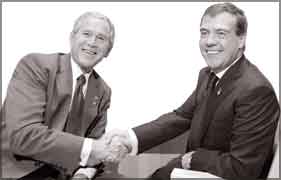G8 Summit approves climate 'vision'
Leaders from the world's developed nations and rising economic powers
have agreed on a "shared vision" on climate change at the G8 summit in
Japan.
But no definite agreements have been announced and India and China
have reportedly dismissed a target to halve emissions by 2050.
Leaders from eight emerging economies held talks with the Group of
Eight rich nations on the final day of the summit.
A US official said the broad agreement represented progress.
|

German Chancellor Angela Merkel, U.S. President George W.
Bush and Japanese Prime Minister Yasuo Fukuda plant the
memorial tree prior to the G8 leaders' family photo session
at the Windsor Hotel Toya Tuesday, July 8 in Toyako,
Hokkaido, Japan. AP |
Jim Connaughton, chairman of President Bush's Council of
Environmental Quality, told the Associated Press that the agreement
"will give us greater confidence and commitments as we go to next year".
The statement on climate was approved by the 16 nations on the third
and final day of the summit in Toyako, northern Japan.
Signatories recognised the need for "deep cuts" in global greenhouse
gas emissions to fight global warming. But the statement stopped short
of urging numerical targets for those reductions. The document describes
climate change as "one of the great global challenges of our time".
It adds that "leaders of the world's major economies, both developed
and developing, commit to combat climate change in accordance with our
common but differentiated responsibilities and respective capabilities".
Global problems
Japanese Prime Minister Yasuo Fukuda said the G8 leaders had
demonstrated they were serious about tackling climate change.
"It is the very first time ever that leaders of the major economies
have got down to vigorous discussions on a broad range of
climate-change-related issues, and I believe that the leaders have shown
strong political will," he said.
|

U.S. President George W. Bush, left, shakes hands with
Russian President Dmitry Medvedev prior to the start of a
working session at the Group of Eight (G-8) Summit at the
Windsor Hotel Toya in Toyako Town, Hokkaido, Japan, Tuesday,
July 8. AP |
BBC diplomatic correspondent Bridget Kendall said the inclusion of
eight emerging nations is an admission that G8 decisions on their own
are no longer enough - global problems need global solutions.
On Tuesday the G8 - which includes the UK, US, Canada, France,
Germany, Italy, Japan and Russia - restated its "vision" of halving
harmful emissions by 2050. Emerging countries and environmentalists were
scathing of the announcement.
Mexico, Brazil, China, India and South Africa challenged developed
countries to cut their greenhouse emissions by more than 80% by 2050. A
spokesman for the WWF's Global Climate Initiative called the G8
statement "pretty pathetic".
Nuclear talks
The summit has seen G8 leaders voicing concern about soaring oil and
food prices, the situation in Zimbabwe, and the pace of aid being sent
to Africa.
But climate change has been one of the stickiest issues - with the
G8's position receiving a volley of criticism from both
environmentalists and developing nations.
China's President Hu Jintao used his speech at the summit to urge all
countries - particularly developed countries - to slash farm subsidies
and trade barriers to calm soaring food prices. Mr Hu was at the meeting
as part of an "outreach" group of the world's fastest-growing economic
powers.
China along with Brazil, Mexico, India and South Africa negotiated
with the G8 countries for most of the morning. They were joined by the
leaders of Indonesia, South Korea and Australia for the discussion on
climate change.
On the sidelines, Indian Prime Minister Manmohan Singh and US
President George W Bush discussed a nuclear deal which has been stalled
for the past three years.
The US agreed to help India with its civil nuclear programme more
than three years ago, but Mr Singh has faced fierce opposition from
left-wing parties who have now stopped supporting his governing
coalition. No announcement was made on the nuclear deal but Mr Singh
said he was "very pleased" with US relations.
BBC
|
